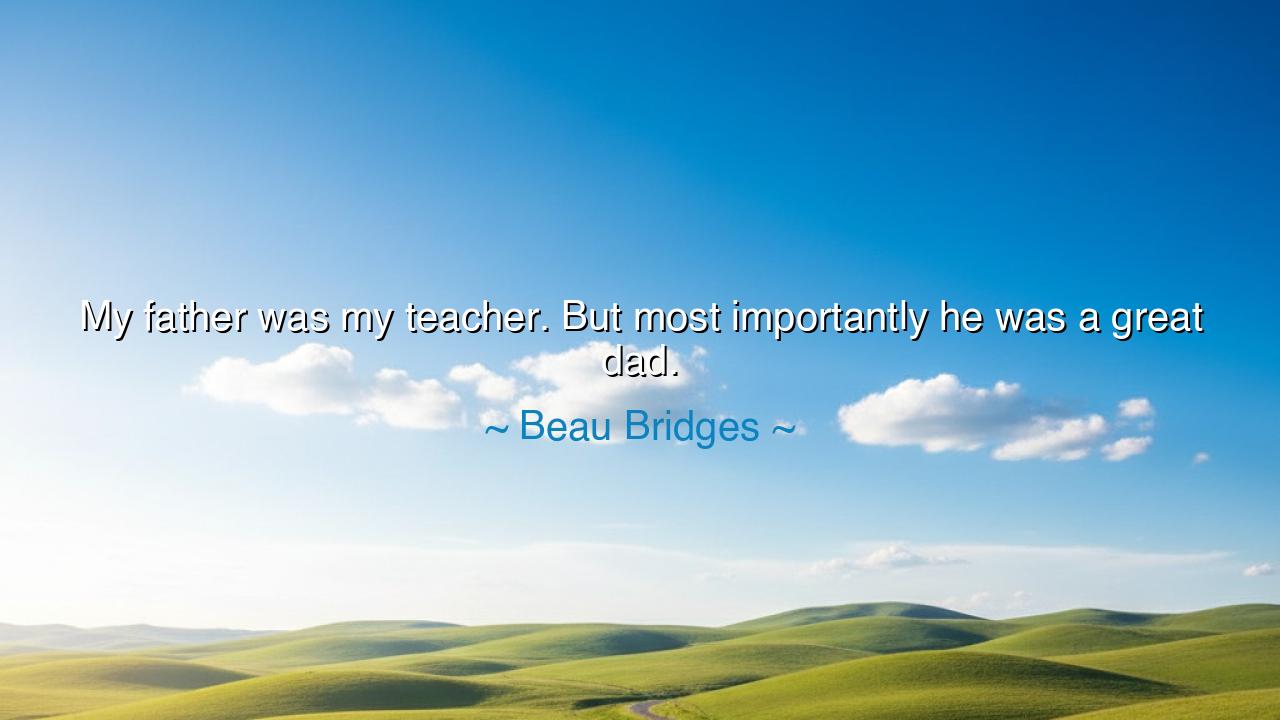
My father was my teacher. But most importantly he was a great






Hear the words of Beau Bridges, spoken with reverence and warmth: “My father was my teacher. But most importantly, he was a great dad.” In these simple words lies the sacred harmony between wisdom and love, between the guidance of the mind and the nurturing of the heart. For many can teach, but few can truly father; many can instruct the ways of the world, but only a great dad can awaken the soul to goodness. Beau Bridges speaks not merely of a parent, but of a pillar — one who shaped him not through command alone, but through compassion, example, and steadfast care.
The origin of this quote lies in the life of Beau Bridges, son of the legendary actor Lloyd Bridges. Raised in a household of art and discipline, Beau learned the craft of acting from his father’s side — not as a lecture, but as a way of being. His father was indeed his teacher, showing him the dedication, humility, and integrity needed to live with purpose. Yet, what Beau cherished more deeply was not the fame or wisdom his father imparted, but the gentleness, humor, and humanity that filled their home. In honoring his father, he revealed a timeless truth: that the greatness of a parent is not measured by skill or success, but by the love with which they shape a child’s spirit.
Throughout the ages, the bond between father and son, between teacher and student, has been revered as one of the most sacred ties known to humankind. The ancients told of Socrates and his disciples, of Arjuna guided by Krishna on the battlefield, of kings and sages who trained their heirs not merely in knowledge, but in the art of living. Yet even they understood — teaching alone is not enough. Without warmth, wisdom turns to rigidity; without affection, guidance becomes mere authority. Thus, Beau Bridges reminds us that the truest teacher is one who instructs with love, and the truest father is one who teaches not only through words, but through the living example of his life.
Consider the story of Marcus Aurelius, philosopher and emperor of Rome. In his Meditations, he thanks his adoptive father, Antoninus Pius, not for wealth or status, but for his virtues — for patience, kindness, humility, and devotion to duty. “From my father,” he wrote, “I learned mildness of temper, and an unchangeable resolution in judgment.” These were not lessons of the academy, but of daily life — the lessons of presence, of balance, of quiet strength. Like Bridges’ father, Antoninus was both teacher and dad, shaping the heart of his son through the steady flame of example.
In this way, Beau Bridges’ words are not merely personal — they are universal. They remind us that fatherhood is both an art and a calling, one that demands patience, sacrifice, and deep humanity. A father must be both guide and guardian, teacher and friend, stern when the world requires it, but tender when the soul needs rest. To be a great dad is not to be perfect, but to be present — to be the one who listens, forgives, and believes, even when the child cannot yet believe in themselves.
Too many, in their haste for achievement, forget this balance. They teach their children how to succeed, but not how to live. They show them how to earn, but not how to love. They pass on ambition, but not compassion. The wisdom of Beau Bridges’ reflection calls all parents, all elders, to remember: love is the foundation of every lasting lesson. A heart that has known love will learn courage; a soul that has felt seen will grow strong.
So, O listeners of time, take this teaching to heart: be both teacher and nurturer to those you guide. Whether you are a parent, mentor, or friend, let your wisdom be carried not only in your words, but in your kindness. Teach with your actions; correct with compassion; love without measure. For the lessons that endure are those given by the heart, not by the hand.
Thus, when Beau Bridges spoke of his father, he spoke for all who have been shaped by love disguised as instruction, and by discipline tempered with warmth. Remember, then, that the world is filled with teachers — but it needs more great dads, more mentors who raise others through patience and example. Strive, therefore, not only to be wise, but to be kind; not only to lead, but to love. For in the end, the greatest legacy any man can leave is not knowledge or success, but the living testimony of a heart that taught through love.






AAdministratorAdministrator
Welcome, honored guests. Please leave a comment, we will respond soon